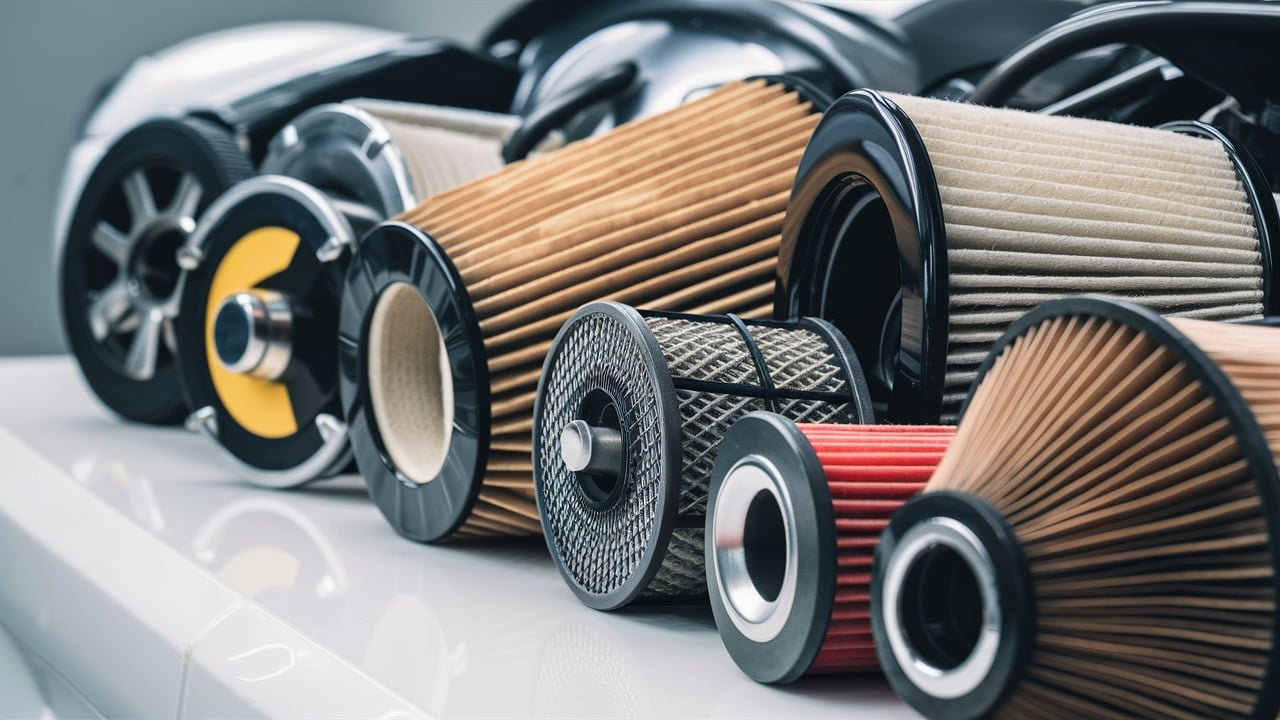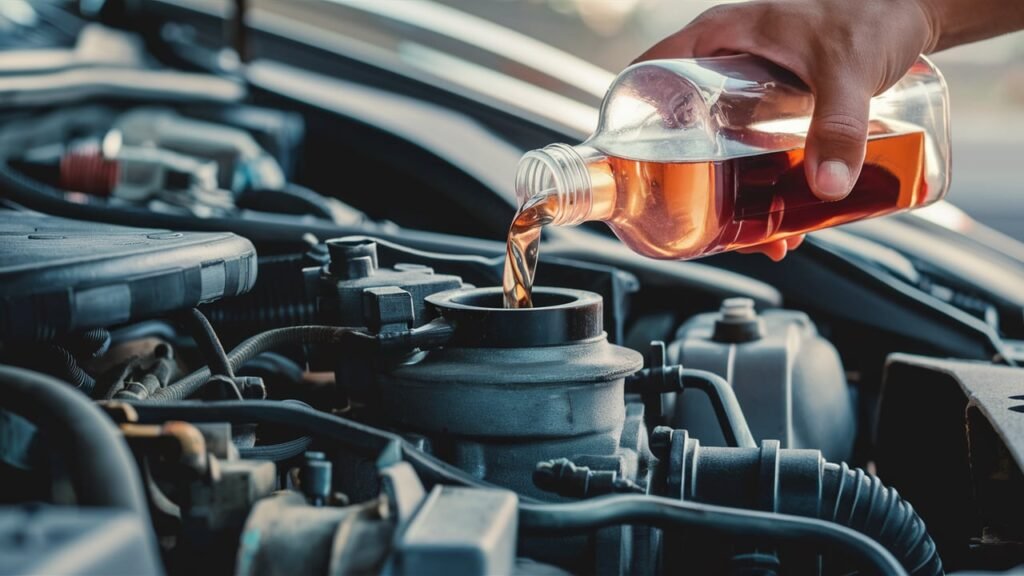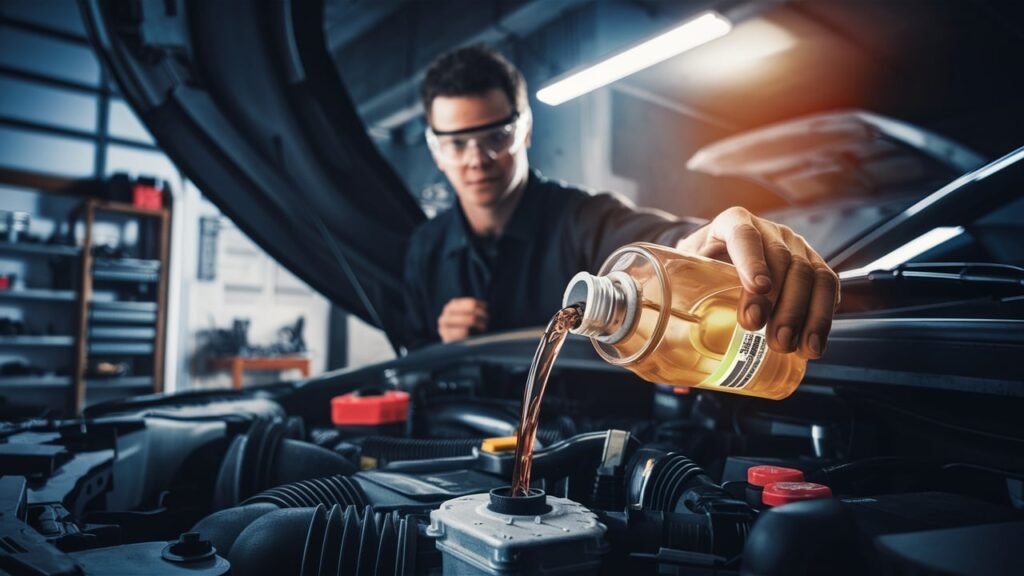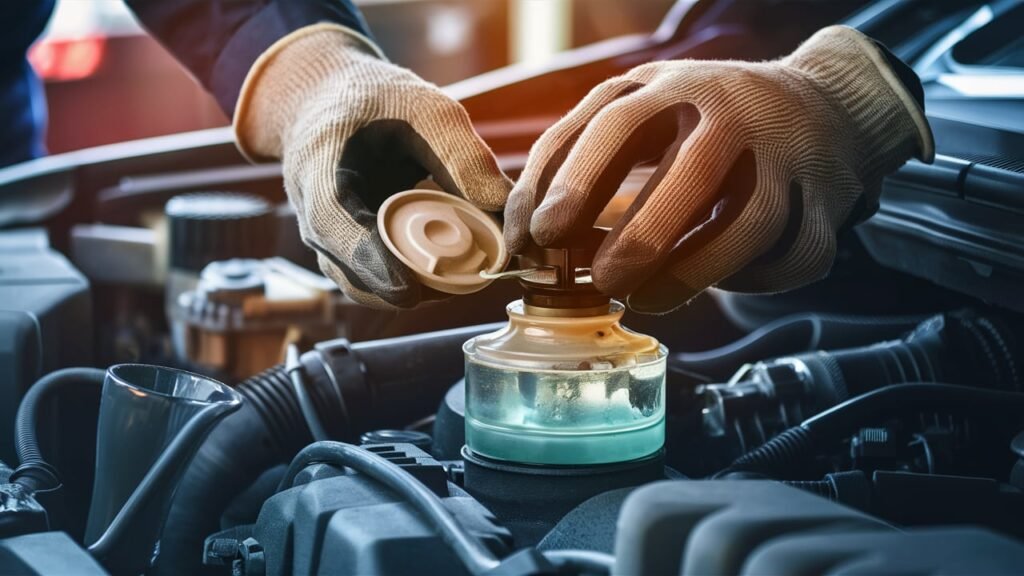
Unveiling the Mechanics of Car Engine Air Filter
A car engine air filter is a component designed to prevent dirt, debris, and other contaminants from entering the engine. It is located in the air intake system and plays a crucial role in ensuring that only clean air mixes with the fuel to form the correct compression ratio. Here are the key functions and aspects of a car engine air filter:
Functions:
Prevents Contamination: The air filter prevents dirt, dust, and other particles from entering the engine, which can cause damage to sensitive components.
Maintains Clean Air: It ensures that only clean air flows through the engine, which is essential for proper combustion and engine performance. Improves Fuel Efficiency: A clean air filter helps maintain optimal fuel efficiency by ensuring that the correct air-fuel mixture is achieved.
Protects Engine Components: By preventing contaminants from entering the engine, the air filter helps protect components like cylinder walls, bearings, and other parts from premature wear and tear.
Symptoms of a Clogged Air Filter:
Reduced Performance: A clogged air filter can cause the engine to work harder, leading to reduced acceleration and overall performance.
Excessive Emissions: Dirty air filters can lead to increased emissions, including black smoke from the exhaust. Check Engine Light: A clogged air filter can trigger the check engine light to come on, indicating a problem with the engine.
Decreased Fuel Economy: A dirty air filter can reduce fuel efficiency, leading to higher fuel consumption.
Replacement and Maintenance:
- Replacement Frequency: Most manufacturers recommend replacing the air filter every 12,000 to 15,000 miles or annually, whichever comes first.
Inspection: Regularly inspect the air filter for signs of dirt or debris buildup and replace it if necessary.
Installation: Ensure proper installation of the new air filter to prevent any damage or performance issues.
In summary, a car engine air filter is crucial for maintaining the health and performance of the engine. It prevents contaminants from entering the engine, ensures clean air for combustion, and helps maintain fuel efficiency. Regular replacement and inspection are essential to ensure optimal engine performance and longevity.
Nestled within the intricate machinery of a car’s engine lies a humble yet indispensable component – the car engine air filter. Defined as a device designed to purify the air entering the engine, this unassuming part plays a vital role in safeguarding the heart of your vehicle.
As automotive enthusiasts, DIY mechanics, or engineering students delve into the depths of what propels their machines forward, understanding the mechanics behind these unobtrusive filters unveils a world of precision engineering and functional significance.
Air filters serve as stalwart guardians against airborne contaminants that jeopardize engine longevity and performance. Their mission is clear-cut – to ensure only clean, debris-free air infiltrates the combustion chamber where power is generated.

Appreciating how air quality directly impacts fuel combustion and mechanical strain underscores the critical role these filters play in maintaining optimal engine efficiency. With each microscopic particle captured, filtered airflow remains unencumbered, charting the course for seamless ignition sequences and peak power output within your vehicle’s mechanical symphony.
Akin to silent sentinels working tirelessly under the hood, air filters epitomize subtlety laced with monumental consequences for the holistic functionality of your cherished automobile. As we unravel the intricacies of these unsung heroes, new vistas await those eager to decipher the elemental nuances driving automotive excellence forward.
Understanding Car Engine Air Filters.
Car engine air filters play a critical role in the operation of vehicles by ensuring that only clean air enters the engine for combustion. The primary function of an air filter is to trap dust, dirt, pollen, and other contaminants present in the air before it reaches sensitive engine components.
By preventing these particles from entering the engine cylinders, the air filter helps maintain optimal fuel combustion efficiency and protects vital parts from premature wear and damage.
Various types of air filters are commonly used in car engines, with each designed to meet specific performance needs. Conventional paper filters are cost-effective and efficient at capturing particulate matter but may need more frequent replacement compared to high-performance filters like foam or cotton-gauze variants.
Foam filters offer superior airflow but require regular cleaning and oiling for optimal performance, making them popular among off-road enthusiasts seeking increased horsepower.
When air filters become dirty or clogged over time due to accumulated debris, their ability to allow sufficient airflow into the engine diminishes. This restriction can lead to reduced power output, decreased fuel efficiency, and increased emissions. To prevent these negative outcomes, regular inspection and timely replacement of air filters are necessary maintenance practices all vehicle owners should prioritize.
Key Components of an Air Filter.
The composition of the filter media plays a pivotal role in how effectively an air filter can trap contaminants and particulates from entering the engine. Most air filters consist of pleated paper, foam, cotton, or synthetic materials. Pleated paper filters are common in OEM applications due to their balanced filtration capabilities and cost-effectiveness.
Synthetic filters, like those made from polyester or nanofiber materials, excel in higher efficiency and airflow restrictions but come at a higher price point. Foam filters offer excellent airflow but may require more frequent cleaning and maintenance. Choosing the right filter media is crucial to ensure optimal engine performance and longevity.
The housing and frame materials used in an air filter construction are equally important components. The housing acts as a protective barrier for the filter media against external elements and ensures a secure fit within the air intake system.
Common materials for housing include plastic, metal, or rubber compounds. The frame provides structural support to maintain the integrity of the filter under varying airflow conditions and prevent leaks that could bypass filtration. Proper construction using durable materials enhances the overall durability and effectiveness of the air filter in maintaining clean airflow to the engine.

The design feature of pleats or folds within an air filter greatly impacts its filtration efficiency. Increased surface area created by pleating allows for more effective trapping of particles while minimizing airflow resistance. Filters with more pleats generally offer superior filtration performance compared to flat-panel designs.
Pleated filters strike a balance between capturing harmful contaminants and ensuring adequate airflow to support engine combustion processes efficiently. Understanding how these pleats enhance filtration capacity can guide vehicle owners in selecting air filters that best suit their driving needs and environmental conditions for optimal engine protection and performance.
Common Air Filter Maintenance Practices.
Regular maintenance of your car engine air filter is crucial in ensuring the optimal performance and longevity of your vehicle’s engine. To uphold this, it is recommended to establish regular inspection intervals to check the condition of the air filter.
Typically, experts suggest inspecting the air filter every 12,000 to 15,000 miles or as indicated in your vehicle’s manual. By adhering to these intervals, you can proactively identify any signs of dirt or clogging in the air filter, preventing potential damage to the engine.
In cases where visual inspection reveals a dirty but still serviceable air filter, proper cleaning procedures can be undertaken to extend its usefulness. Begin by carefully removing the air filter according to your vehicle’s manufacturer guidelines.
Use compressed air or a gentle vacuum cleaner on low settings to remove debris collected within the filter media. Ensure that no tears or damage occur during this process to maintain filtration efficiency. Following cleaning, allow the filter ample time to fully dry before reinstallation.
When the air filter shows signs of excessive wear, clogging, or damage beyond cleaning capabilities, replacement becomes necessary for optimal engine efficiency. Replacement guidelines often recommend changing the air filter every 12 months or 12,000-15,000 miles under normal driving conditions.
For vehicles frequently exposed to dusty environments or off-road terrains, more frequent replacements may be warranted. Always opt for high-quality replacement filters that meet or exceed OEM specifications for proper fitment and filtration performance.
By incorporating these common maintenance practices into your routine vehicle care schedule, you can safeguard your engine from contaminants and ensure consistent airflow for combustion processes.
Regularly scheduled inspections coupled with appropriate cleaning and timely replacements will not only enhance your car’s overall performance but also contribute significantly to extending its lifespan and reducing repair costs over time. Stay proactive in caring for your car engine’s air filter – an often overlooked yet critical component in maintaining peak automotive efficiency and reliability.
Choosing the Right Air Filter for Your Vehicle.
When it comes to selecting an air filter for your vehicle, understanding the differences between Original Equipment Manufacturer (OEM) and aftermarket options is crucial. OEM air filters are designed by the manufacturer specifically for your vehicle make and model.
They often meet factory specifications and are known for their precise fitment and quality. On the other hand, aftermarket air filters offer a wider range of choices in terms of materials and construction.
While some aftermarket filters may provide improved airflow or filtration efficiency, others may not meet the same standards as OEM filters. It’s essential to weigh factors like filtration performance, cost, and compatibility with your vehicle before deciding between OEM or aftermarket air filters.

For those seeking enhanced performance from their vehicles, high-performance air filters present an intriguing option. These filters are engineered to offer superior airflow while maintaining efficient filtration capabilities.
High-performance filters often feature specialized materials or designs that promote better engine breathing and potentially increase horsepower. However, it’s important to balance these performance gains with considerations such as maintenance intervals and overall longevity to ensure that the filter can withstand extended use without compromising engine protection.
Compatibility is a key aspect when choosing an air filter for your vehicle. Ensuring proper fitment with your car’s make and model is vital to prevent issues like leaks or inadequate filtration. Before purchasing an air filter, consult your vehicle manual or verify compatibility information provided by the filter manufacturer.
Pay attention to details such as dimensions, mounting style, and any specific requirements related to your vehicle’s intake system design. By confirming compatibility factors beforehand, you can rest assured that the chosen air filter will seamlessly integrate into your car’s engine system, optimizing its performance and longevity in the long run.
Signs of a Failing Air Filter.
As integral as air filters are to an engine’s health, knowing when they are failing can save you from costly repercussions. One unmistakable sign that it’s time for an air filter replacement is a reduction in engine performance.
If your vehicle experiences sluggish acceleration or misfires, it might be due to a clogged air filter restricting airflow. In severe cases, a dirty filter can lead to engine stalling or even failing to start. Understanding these symptoms can prompt proactive maintenance to avoid more significant issues down the road.
Beyond just affecting performance, a deteriorating air filter can also impact fuel economy and engine longevity. When the air intake is compromised by contaminants bypassing a worn-out filter, the engine has to work harder to maintain performance levels, resulting in increased fuel consumption.
This strain on the engine can also accelerate wear and tear on internal components over time, potentially leading to costly repairs or premature failure of critical parts. Recognizing these effects underscores the importance of regular air filter inspection and replacement.

Timely replacement of an air filter is crucial not only for optimal engine function but also for preventing expensive repairs. By neglecting a clogged or damaged air filter, you risk allowing dirt and debris into the engine cylinders, leading to abrasive damage that could necessitate extensive repairs.
Preventive maintenance by adhering to manufacturer-recommended replacement intervals ensures that your engine operates efficiently and minimizes the chances of contaminants causing harm.
Understanding the domino effect a failing air filter can have on various aspects of your vehicle reinforces why timely replacements are key preventive measures in maintaining both performance and cost-effectiveness in car ownership.
Ensuring Longevity and Performance from Your Air Filter.
To maximize the lifespan of your car engine air filter, implementing a few simple tips can go a long way. Keep in mind that operating in dusty or polluted environments will lead to quicker filter deterioration, so more frequent inspections and replacements might be necessary.
One effective strategy is to avoid driving behind large trucks or on unpaved roads whenever possible to reduce the intake of debris into your engine’s filtration system. Additionally, ensuring regular servicing intervals for your vehicle will help maintain optimal filter performance over time.
Protecting the air intake system from contaminants is crucial for the longevity of your air filter and overall engine health. Consider installing a pre-filter over the main air filter to capture larger particles before they reach the primary filtration component.

This added layer of defense can significantly extend the life of your air filter by preventing larger debris from clogging it prematurely. Moreover, parking your vehicle in a clean and sheltered area can safeguard the intake system from external pollutants, reducing the risk of contaminants entering and compromising your filter.
Routine maintenance plays a pivotal role in preserving optimal airflow and combustion efficiency within your vehicle’s engine. Regularly inspecting, cleaning, and replacing your air filter as needed ensures that the engine receives an adequate supply of clean air for combustion processes.
Neglecting this maintenance aspect can result in reduced engine performance, diminished fuel efficiency, and potentially costly repairs down the line due to inadequate air filtration. By adhering to manufacturer-recommended service schedules and following proper maintenance practices, you can uphold peak performance levels while safeguarding critical engine components against premature wear and damage.
Conclusion.
In scrutinizing the intricate mechanics of car engine air filters, it becomes unequivocally clear that these seemingly unassuming components play a paramount role in safeguarding the vitality and efficacy of a vehicle’s powerplant.
By comprehending the pivotal function of air filters as gatekeepers preventing harmful debris from infiltrating the engine, automotive enthusiasts, DIY mechanics, vehicle owners, and engineering students can zealously embark on optimizing their vehicle’s performance through diligent upkeep of this fundamental filter system.
With an arsenal of knowledge concerning the types, maintenance protocols, key components, and indicators of a failing air filter at their disposal, individuals invested in the welfare of their automobiles are well-equipped to proactively preserve engine health and longevity.
From discerning OEM versus aftermarket options to deciphering telltale signs necessitating immediate replacement, each facet examined unveils how meticulous attention to air filtration intricacies can preemptively stave off costly repairs while concurrently enhancing fuel economy and combustion efficiency.
As stakeholders engage in prudent selection practices and adhere to prescribed maintenance routines delineated within this discourse, they fortify their vehicles against preventable wear and tear—a testament to their unwavering commitment to vehicular preservation.
Through unraveling the enigmatic nuances underpinning car engine air filters, this elucidative exposé serves as a beacon for those seeking to delve into the inner workings of automotive sophistication with analytical precision.
May these revelations propel individuals toward an enlightened era in which vigilance over such ostensibly inconspicuous apparatuses begets unrivaled vehicular steadfastness—an embodiment of meticulous engineering excellence that resonates far beyond mere means of conveyance.




